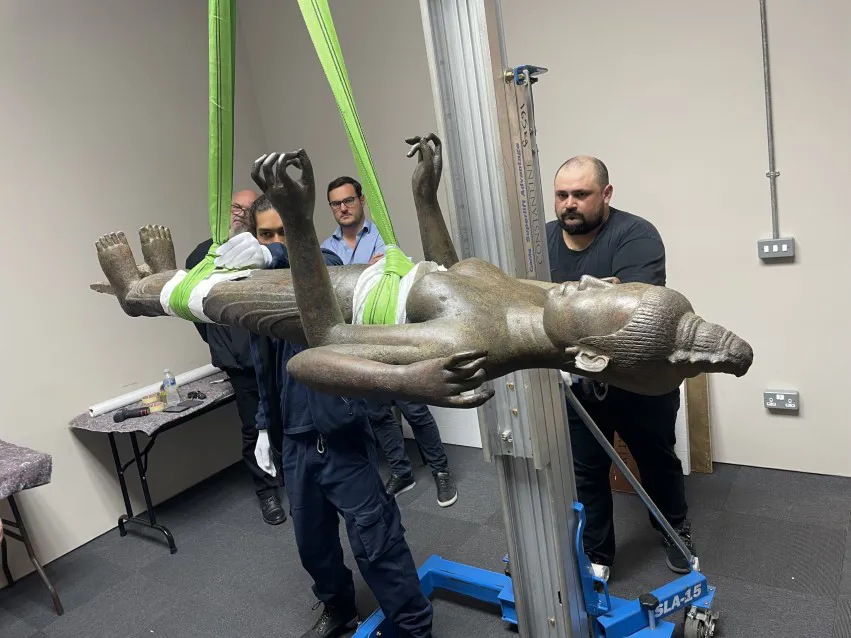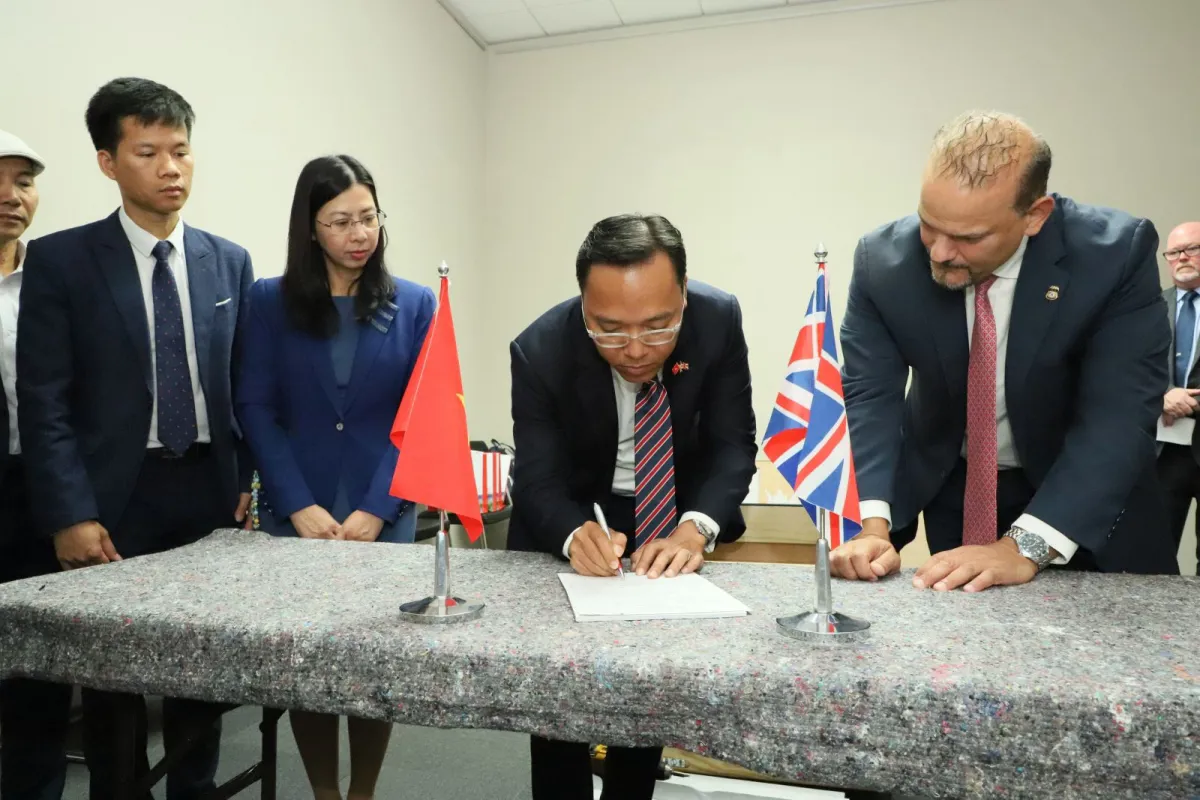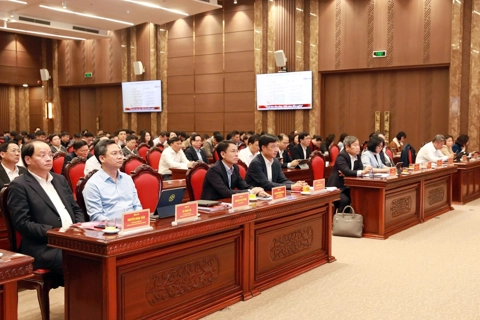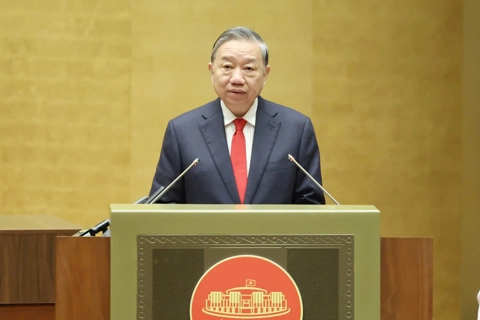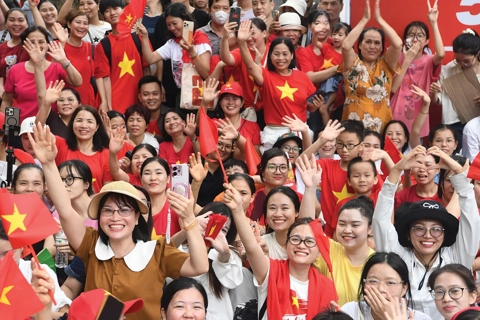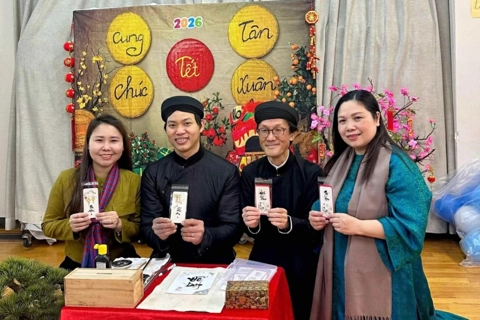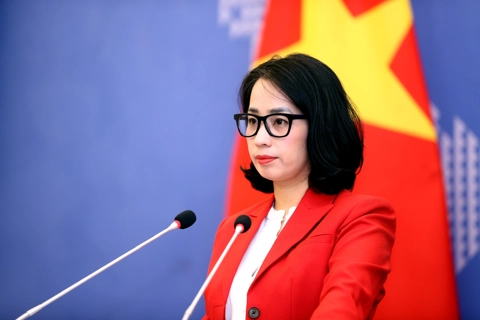Bronze sculpture of goddess Durga returned to Vietnam
A bronze statue of Goddess Durga smuggled out of Vietnam has been repatriated thanks to joint efforts by the US, UK and Vietnam.
An ancient bronze statue of the goddess Durga that was trafficked out of the country 16 years ago has been returned to Vietnam and is now being preserved at the Vietnam National Museum of History, according to the Department of Cultural Heritage under the Ministry of Culture, Sports and Tourism.
The four-armed bronze statue, with a symbolic value of more than £14 million (US$18 million), stands 191cm high and weighs 101kg, depicting the image of the Hindu goddess Durga.
The four-armed bronze statue of the goddess Durga. Photo: MCST |
The statue illustrates the culture, religious beliefs, and history of the Champa community, as well as the ethnic diversity of Vietnam. The statue's return not only enriches the country's collection of Vietnamese cultural and historical artefacts, but also demonstrates the success of antiquities repatriation policies in halting the loss of cultural heritage.
In early August 2023, the Vietnamese Embassy in the US informed the Ministry of Culture, Sports and Tourism (MCST) of a four-armed statue of the goddess Durga that had been found in London during an antiquities trafficking investigation.
The official website of the US Immigration and Customs Enforcement (ICE) announced that the US had filed and settled a civil forfeiture action for US$12 million derived from the sale of stolen Southeast Asian antiquities by indicted British antiquities dealer Douglas Latchford.
“The settlement with Latchford’s estate, who died in 2020, resolves claims that he transferred proceeds from the sale of stolen antiquities to bank accounts in the Bailiwick of Jersey. As part of the settlement, Latchford’s estate has also agreed to the forfeiture of a seventh-century bronze statue depicting the four-armed goddess Durga, which is alleged to have been stolen from Vietnam in 2008 and which Latchford allegedly purchased using tainted funds,” said the website.
It also said that in 2008 and 2009 Latchford bought the four-armed goddess Durga with money from the sale of stolen and smuggled antiquities.
The statue is being packed for return to Vietnam. Photo: MCST |
There is evidence that Latchford traveled to Vietnam in November 2008 to collect the piece and instructed his bankers to transfer around US$2 million to the bank account of a person with a Vietnamese email address.
Three months later, he emailed a dealer a photograph of the statue lying on its back, covered in what appeared to be dirt and minerals, indicating a recent excavation.
Latchford identified My Son - a UNESCO World Heritage site in Vietnam - as the place where the Durga statue had been found.
The relevant units of the MCST found that the bronze statue of the goddess bears the defining characteristics of sculptures and art of the early Champa period (7th century), with influences from the late period sculptural art of the Oc Eo culture (1st-7th century).
As required by its responsibilities under the Cultural Heritage Law, the MCST officially confirmed with the Vietnamese Embassy in the UK that the statue was of Vietnamese origin.
The Vietnamese mission, representing the MCST, received the artifact from the US Department of Homeland Security and the London Metropolitan Police.
In January, a delegation from the MCST visited the UK to assess the status of the bronze Durga statue, prepare the necessary paperwork for the handover and pack the artifact for return to Vietnam.
On August 16, a plan to send the statue back to its homeland was drawn up by the Vietnamese Embassy in the UK with representatives of the statue's current owner, storage and transport companies and archaeological experts.
Following the visit, Arts Council England granted permission to the Vietnam National Museum of History to take the bronze back home.
Vietnamese Ambassador to the UK Nguyen Hoang Long and representatives of the London Police at the statue handover ceremony. Photo: VNA |
According to Director of the Department of Cultural Heritage Le Thi Thu Hien, the return of the statue is a result of Vietnam's efforts to implement its obligations under the 1970 UNESCO Convention on the Means of Prohibiting and Preventing the Illicit Import, Export and Transfer of Ownership of Cultural Property.
The Goddess Durga was returned to Vietnam on June 18. It is being kept at the Vietnam National Museum of History in Hanoi.



